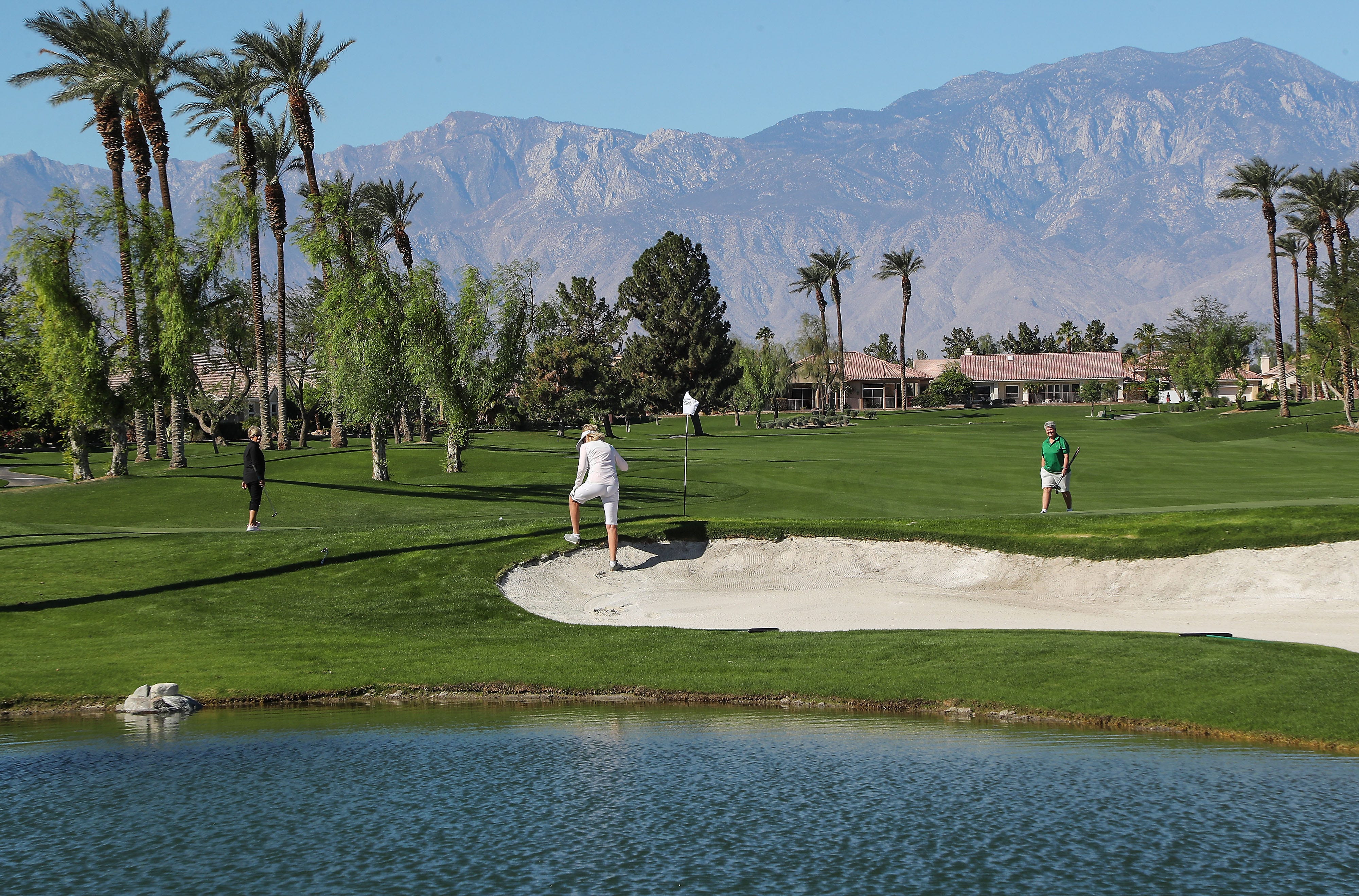The staff at Mountain Vista Golf Club at Sun City Palm Desert knows its clientele, and making that clientele happy was a big reason behind a significant renovation of the San Gorgonio Course this summer.
“We were basically looking to make it a little bit more playable for the residents,” said Joe Johnson, the director of golf at Mountain Vista. “Cutting maintenance costs, we eliminated some bunkers, reconfigured some bunkers so that the maintenance of the bunkers themselves was easier.”
The changes to the San Gorgonio course, one of two 18-hole layouts at Mountain Vista, debuted to residents this week after the course reopened from overseeding. The Santa Rosa Course is now closed for overseeding.
While Sun City Palm Desert is a 55-and-over community off Washington Street just north of Interstate 10 in Palm Desert, the course staff want the course playable but not ridiculously easy for older golfers.
“We didn’t want to make the course easier, but we wanted to make it less penal for higher handicaps but not for the better player,” said Clint Atherton, general manager of the facility.

Jay Calderon/The Desert Sun
More: Ironwood Country Club latest desert golf club to switch to MiniVerde grass for greens
More: A new desert pro golf tournament? It won’t be easy, but it could happen
The biggest change to the San Gorgonio course was the conversion of all 18 greens and practice greens, about 3.5 acres in total, to miniverde, a hybrid Bermuda grass that is gaining popularity at desert courses as a putting surface.
“Looking long term with the water situation, the overseeding, the price of seed and everything that is done with greens, (other courses) have had a lot of success,” said Tyler Truman, director of agronomy at Mountain Vista. “Eldorado put in miniverde last year, Ironwood, Andalusia, Annenberg Estate have it, and they have been able to keep them fairly green and putting very true during the winter months without having to overseed.”
The new grass was just the start of reconfiguring some of the putting surfaces, Johnson said. Some greens were expanded back to their original size, with Truman saying some greens had lost 15 feet of surface due to shrinking through the years. In addition, many of the greens were softened, with workers taking out large swales or hills in some of the greens that made the surfaces effectively smaller than the actual square footage.
Makings some greens easier for players, staff
“We had problems with a couple of greens where we had three pin placements, and you need 18 to 20 pin placements on a green or you get places wore out,” Truman said. “So that is where it started, and it was like, okay, let’s get to a master plan. We did a lot of different things on those, and we built on it from there.”
In softening the greens, Truman and his staff also changed some of the green positioning, either moving the putting surfaces or raising them to make the approach shots into the greens easier. The renovation was done under the guidance of architect Casey O’Callahan, whose most notable desert work is the South Course at Indian Canyons Golf Resort in Palm Springs.

Jay Calderon/The Desert Sun
On the seventh hole, for example, a cluster of five smaller bunkers to the left of the fairway were turned into a single bunker. Other bunkers were made smaller and still other bunkers were eliminated completely, with those areas reshaped to help bring a ball back into play from the rough or near the greens.
Johnson believes the golf course will lose perhaps two strokes off the new slope rating and index for the layout, but that the course should continue to play as difficult as before for residents. The course will still play around 6,700 yards from the back tees.
Other work during the summer included draining and re-lining three lakes to help save water, and some work on the course’s irrigation system. A few palm trees throughout the course were also removed to improve sightlines on a few holes.
Mountain Vista is also taking the opportunity to do experiments with hybrid Bermuda grasses in a continuing effort to find grasses that can reduce or eliminate the need for overseeding. In a heavy traffic area in the fairway of the par-4 sixth hole, two different hybrids, tiftuff and tiflatitude, are planted in side-by-side patches across the width of the fairway.
“We are looking not only if it goes brown, but also looking at how well it holds its color during the winter months, how do they hold up with cart traffic and divot recovery,” Truman said. “That’s this is 150 yards out from the green. We are going to put sand in here without the seed in it (for divot repair) and see how well it recovers and grows. We will probably do this for a year or two.”
Similar work could be coming in the next year or two to the Santa Rosa Course, Johnson said. Atherton added that because Sun City Palm Desert had the money to do the work, there were no assessments to club members for this summer’s work.
The work was done for the residents of Sun City Palm Desert, but also for the 15 percent of tee times filled by outside play, Johnson said.
“Most of them play on the weekend, which is odd, because you have a better chance of getting on this golf course on the weekend than you do during the week,” Johnson said. “Because all of our (Sun City) clubs play, all of our residents play Monday through Friday. So we get really busy Friday, Saturday and Sunday with people coming in from Orange County, L.A. County and what have you.”
Larry Bohannan is The Desert Sun golf writer, he can be reached at larry.bohannan@desertsun.com or (760) 778-4633. Follow him on Facebook or on Twitter at @larry_Bohannan. Support local journalism. Subscribe to The Desert Sun.

